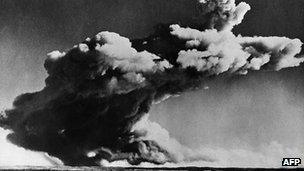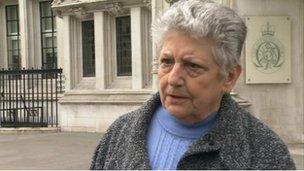Veterans lose nuclear weapons test damages bid
- Published

The British nuclear tests took place in the South Pacific region in the 1950s
Hundreds of ex-servicemen allegedly made ill by nuclear weapons tests in the 50s have lost a Supreme Court bid to be allowed to seek compensation.
The court ruled it was too long since the problems - including cancer and skin defects - had emerged, for the claims against the Ministry of Defence.
The ruling related to nine "lead claims", from a total of 1,011 cases.
The MoD denies the tests involved radiation exposure and that health problems resulted from this.
The group of 1,011 ex-servicemen has battled for more than two years through the High Court and Court of Appeal for permission to launch damages claims against the Ministry of Defence.
In the Supreme Court on Wednesday, a panel of seven judges rejected this bid by a majority of four to three.
After reading out a summary of the court's decision, Lord Wilson said: "Putting aside the law for one moment, all seven members of the court would wish to record their personal sympathy for the veterans."
He added: "It must be bad enough for the nine veterans, and the other claimants, to learn that they have lost this final round, but to learn that they have lost by the narrowest possible margin must make it even worse."
'Brave men'
The veterans blame ill-health, including cancer, skin defects and fertility problems, on their involvement in the 21 atmospheric nuclear tests carried out by the British government in Australia and on Christmas Island in the Pacific Ocean between 1952 and 1958.
Trevor Butler, 74, of west Hull, served with the Royal Engineers on Christmas Island in 1958.
He believes his chronic ill-health, including a crumbling spine, kidney problems and skin complaints are as a result of the nuclear tests.
After the Supreme Court ruling, Mr Butler said: "I'm absolutely devastated. After all the years of pain and anguish how can they do it to us?
"We genuinely believed that the documentation from our specialists would show the public that we were right and the MoD were wrong.
"What we have suffered is completely irrelevant to the MoD. They have just brushed us aside on a legal technicality."

Services widow Wendy Brothers said she wanted justice and recognition for the veterans
Wendy Brothers, whose husband John was an RAF navigator who flew through several nuclear clouds and died of cancer in 2000, said she would not stop campaigning for the veterans.
She told the BBC: "It's justice, and recognition. It's not about monetary compensation, its recognition of the sacrifices those brave men made, quite uncomplainingly.
"They haven't had justice, that's what I'm after, justice for them."
William Middlemass, 76, a nuclear test veteran from Lincolnshire, gave his reaction to the decision.
He said: "It's the type of thing we've got used to over the years because of the type of defence the MoD are putting up.
"They tend not to talk about health or radiation - they are more interested in talking about time issues."
'Fighting veterans'
BBC defence correspondent Jonathan Beale at the Supreme Court said it was hard to see how the veterans could now take their case forward.
The BBC understands that five of the nine claimants have died, one most recently at the weekend.
Lawyers for the veterans are studying the ruling on the lead claims to see how many of the remaining cases could still proceed, and estimate hundreds of veterans or their families could still launch damages claims in the High Court.
Veterans' lawyer Neil Sampson said: "The approach that this government takes is to waste resources on fighting veterans rather than co-operating with them.
"There are some things in life that are wrong. The approach of the government to this issue is one of those things."
'Doomed to fail'
The MoD said in a statement: "The Ministry of Defence recognises the debt of gratitude we have to the servicemen who took part in the nuclear tests. They were important tests that helped to keep this nation secure at a difficult time in terms of nuclear technology.
"The Supreme Court ruled today in favour of the MoD that the claims brought by nuclear test veterans were time-barred and declined to allow the claims to proceed under the statutory discretion.
"Perhaps of greater significance is that all the justices recognised that the veterans would face great difficulty proving a causal link between illnesses suffered and attendance at the tests.
"The Supreme Court described the claims as having no reasonable prospect of success and that they were doomed to fail."
In 2009, 10 lead claimants won the first battle for the veterans when a High Court judge said the claims could go ahead.
But the MoD appealed and a Court of Appeal ruling in 2010 blocked nine of the 10 claims after judges said they were "statute-barred" because they had been made too late.
The ex-servicementook the case to the UK Supreme Court, external- the highest court of appeal in the UK - in November.
The four-three ruling saw justices Lord Brown, Lord Mance, Lord Walker and Lord Wilson come down against the appeal, and Supreme Court President Lord Phillips, Lady Hale and Lord Kerr in favour.
- Published28 July 2011
- Published22 November 2010